Easy and delicious keto coconut shrimp brings you better than restaurant flavor while at the same time gluten-free and sugar-free. Sweet coconut and shrimp pairs perfectly with a spicy keto sweet chili sauce.
Pin it for later here:
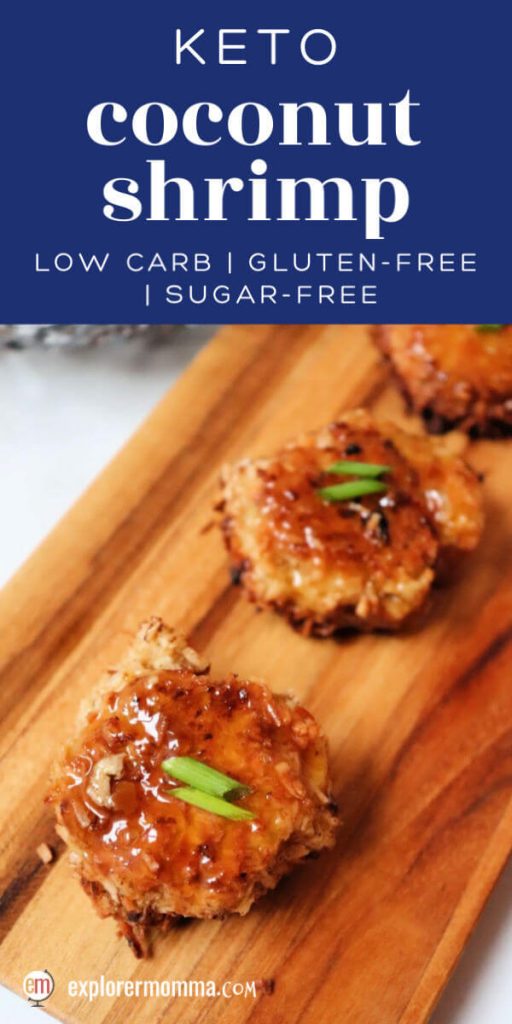
As an Amazon Associate and member of other affiliate programs, I earn from qualifying purchases.
IN A HURRY?
While I think you'll love my super helpful tips and fun stories, I also realize we are sometimes pressed for time and just need a good recipe!
Scroll down to the bottom of the page for the printable recipe to make it NOW or PIN it here for later!
Why do shrimp turn pink when cooked?
Have you ever wondered how exactly flamingos turn pink from the food they eat?
I've always been told they eat shrimp, shrimp are pink, and the flamingoes eat so much shrimp they turn pink too! But really, if you look at a shrimp, is it pink?
No! It's a rather unappetizing gray color. Actually, shrimp don't turn pink until they are cooked. Yes! The exoskeleton is a bluish-gray but contains pigments called astaxanthin. The astaxanthin is wrapped up in protein chains (called crustacyanin) hiding the lovely pink color from the world!
Fact: Did you know salmon and lobsters have this same carotenoid (pigment)?
However, when you heat the shrimp, it releases the hold the protein chains have and lets out the astaxanthin. This turns the shrimp a fabulous shade of pink. Also, it's the same reason lobsters turn red when you cook them.
But why are flamingos pink?
Okay, back to the flamingos. That still doesn't explain how they turn pink! Well, when the flamingos eat the raw shrimp, their digestive juices eat away the protein chain. And guess what happens?
Exactly. The glorious pink is released and makes the flamingo feathers pink. And who doesn't like pink flamingos?!
Anyway, like I was saying, shrimp is the fruit of the sea. You can barbecue it, boil it, broil it, bake it, sautés it. There's, um, shrimp ka-bobs, shrimp creole, shrimp gumbo, pan-fried, deep-fried, stir-fried. There's pineapple shrimp, lemon shrimp, coconut shrimp, pepper shrimp, shrimp soup, shrimp stew, shrimp salad, shrimp and potatoes, shrimp burger, shrimp sandwich... That's, that's about it.
- Mykelti Williamson
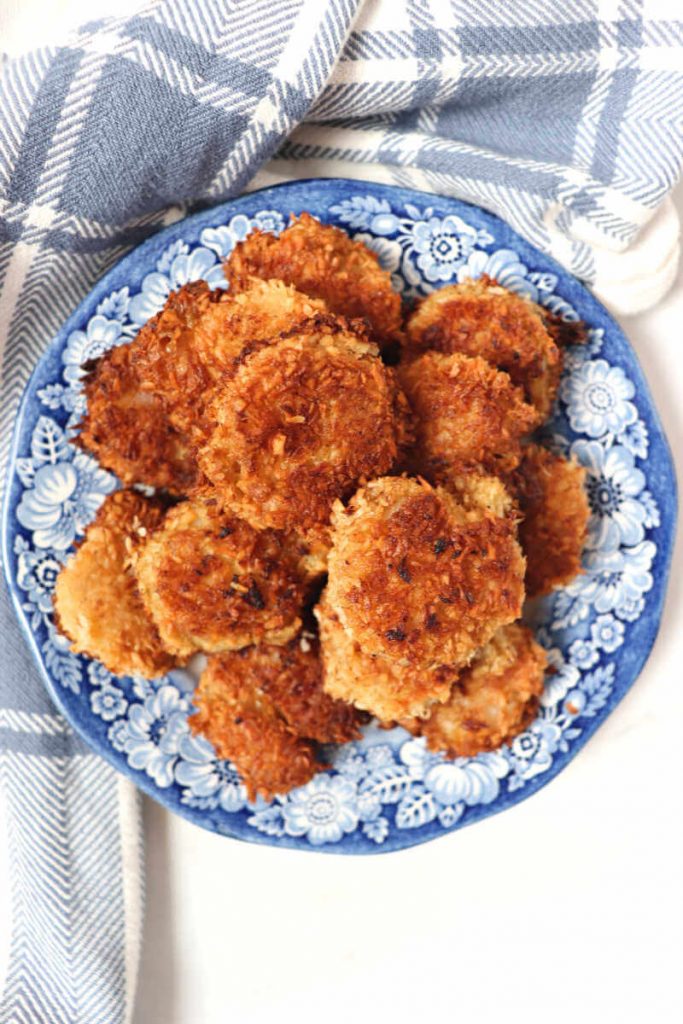
What kind of shrimp should I buy?
Ideally, I would buy medium to large-sized fresh-caught shrimp. However, when I'm in Mom mode and in a hurry, I tend to buy what I can get. If I can get fresh then I do, otherwise, I get a good quality uncooked frozen shrimp.
In my time I've deveined and peeled plenty of shrimp, but I know it's not a task I enjoy. Therefore, I prefer to buy peeled and deveined shrimp with the tails on.
You'll notice in these pictures, my shrimp have no tails! While they are much prettier, or aesthetically pleasing, with the tail on, the children are more likely to eat them at my house without a tail.
Yes, as with most things around the house lately, I opt on the side of what the kids will like. If the tail's already removed, it's much easier to eat. And I can get the kids to at least try it! Well, and I love them either way!

TO MAKE KETO COCONUT SHRIMP YOU'LL NEED:
- 3 medium-sized bowls
- a spatula
- whisk
- measuring cups
- a cast-iron skillet or frying pan
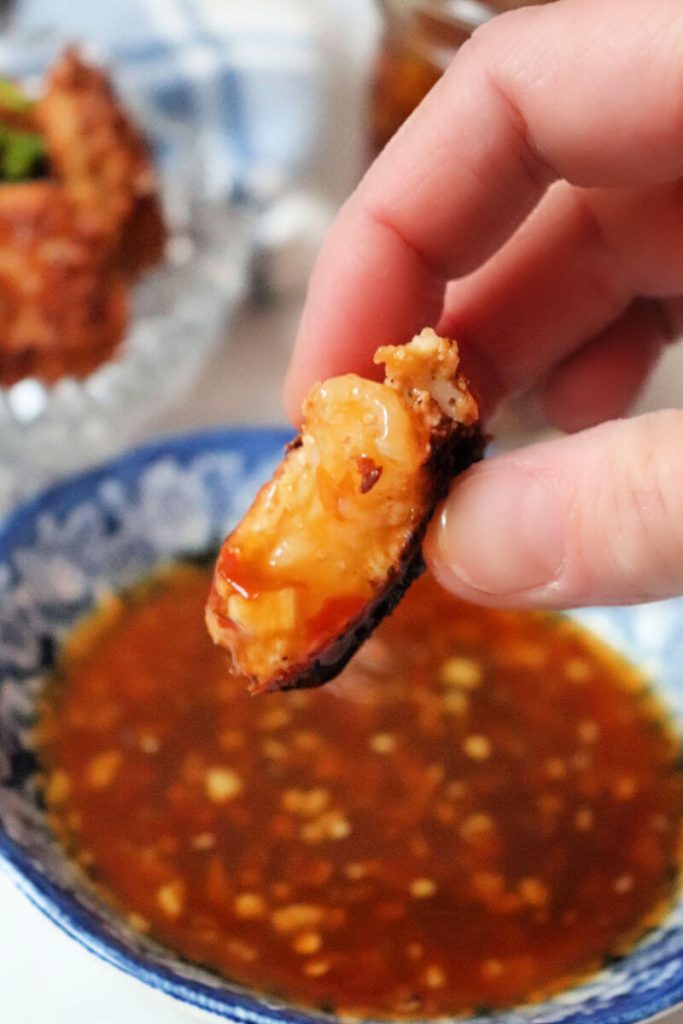
How to make keto coconut shrimp
To begin, get out all the ingredients and kitchen utensils.
First, you're going to start with 3 medium bowls. Combine the coconut flour, salt, and pepper in one. In bowl number two, beat the eggs. Then mix the coconut and sweetener together well in the third.
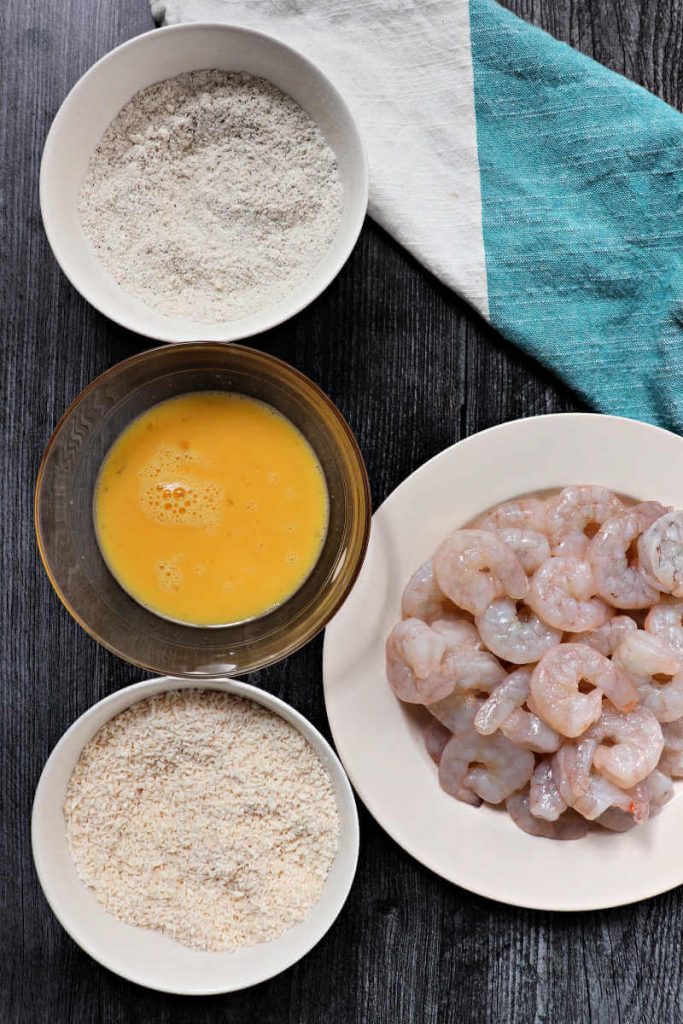
Second, it's time to "bread" the shrimp with our gluten-free coconut coating.
Start with the first bowl and dip the shrimp into the coconut flour, be sure it sticks all around. Move to the second bowl and coat it with the beaten eggs, and then dredge the shrimp into the coconut mixing, pressing gently to adhere.
Be sure to get a lot of coconut on each shrimp. Set the coated shrimp aside on a plate and continue the process with all the remaining shrimp.
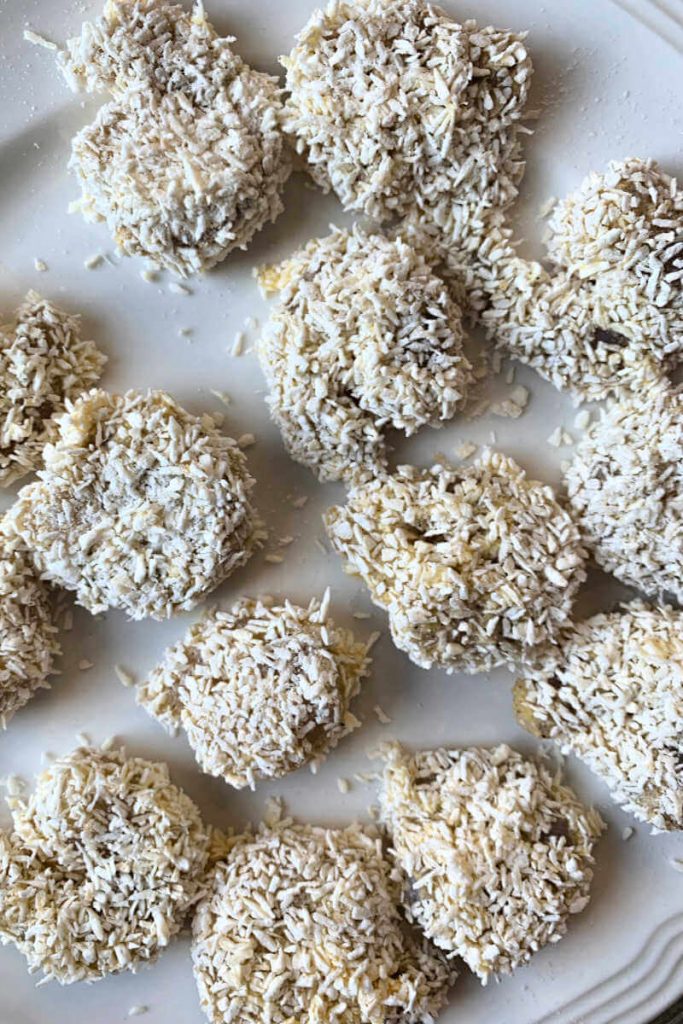
How to fry the gluten-free shrimp
It may seem overwhelming and a mess to fry just about anything, but with these shrimp I like to do an easy pan-fry.
Put a large cast-iron skillet or frying pan on the stove on medium heat. Then add enough coconut oil to cover the bottom, usually about one-third of a cup. Fry the coconut shrimp in batches, but try not to crowd them in the pan.
I find it easiest to fry about 7 at a time. Put them in the hot oil with tongs and flip them over after 2 minutes. Now fry the other side for 2 minutes or until golden brown. If you like them darker fry for 3 minutes on each side.

After that, while you fry the rest, place the finished coconut shrimp on a plate lined with a paper towel. They are best served with keto sweet chili sauce or your preferred keto dipping sauce.
I like to sprinkle them with some chopped chives, but that's optional. Or use whatever herb you have and like.
How to store keto coconut shrimp
To be honest, I find that anything fried is best the day it's made. However, if you have leftovers, you can always keep them in the refrigerator for 3-4 days. Or you could freeze them for up to a month.
To reheat the shrimp I like to place them on a baking pan on 350 degrees Fahrenheit for 10-15 minutes or until they're warm and crisp.
Unfortunately, to microwave them will make them limp and not as appealing. You could also try re-frying them, but I like the oven method best.
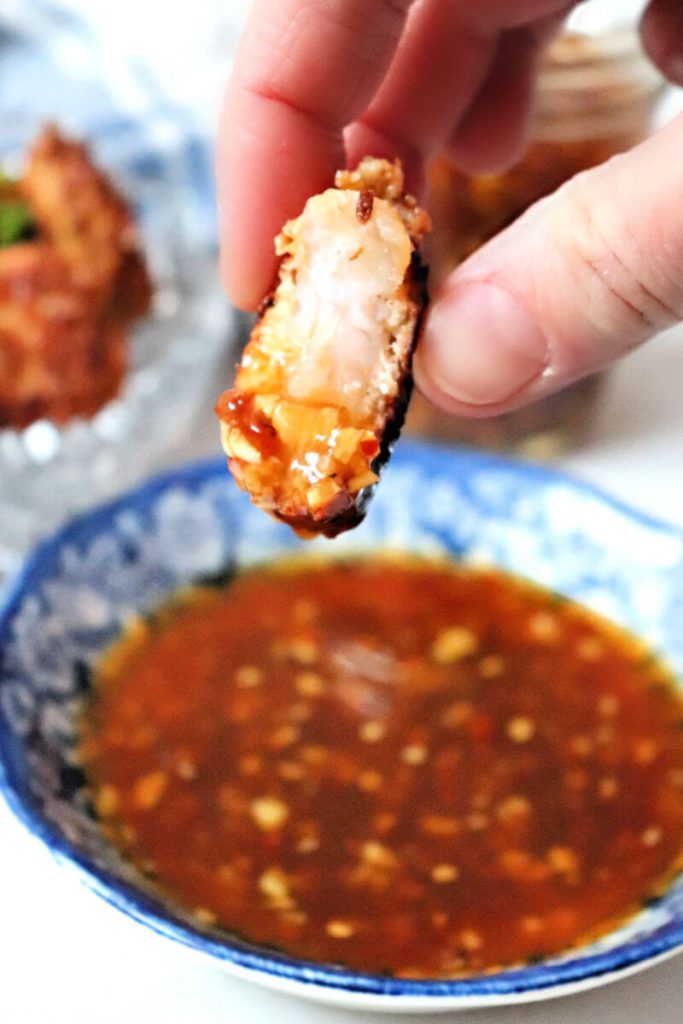
Let food be thy medicine and medicine be thy food.
- Hippocrates
What's your favorite restaurant dinner?
This coconut shrimp is a recipe inspired by an old restaurant favorite. Do you have favorite restaurant meals that could use a keto makeover?
What do you miss? I'd love to give it a go and keto-ize it!
For example, my daughter misses calzones, and we came up with a fathead dough recipe for a delicious keto calzone. We make it quite often although it's not made it on the blog yet.
What others are there? Well, we've loved this keto coconut shrimp, and I hope you do too.
Now, let there be shrimp tonight!
Pin the recipe here:
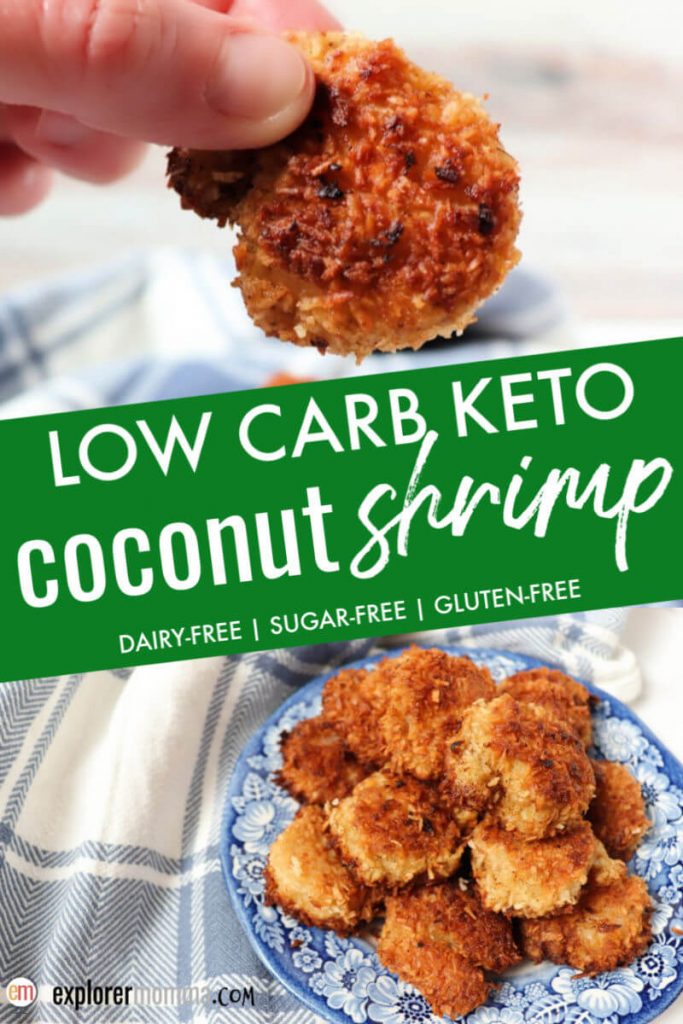
Tag me in your recipe pics on Instagram @explorermomma.
If you LOVE this recipe please consider giving it a five-star rating in the review area below!
More keto shrimp recipes:
and for dessert try:
Printable Recipe
📖 Recipe
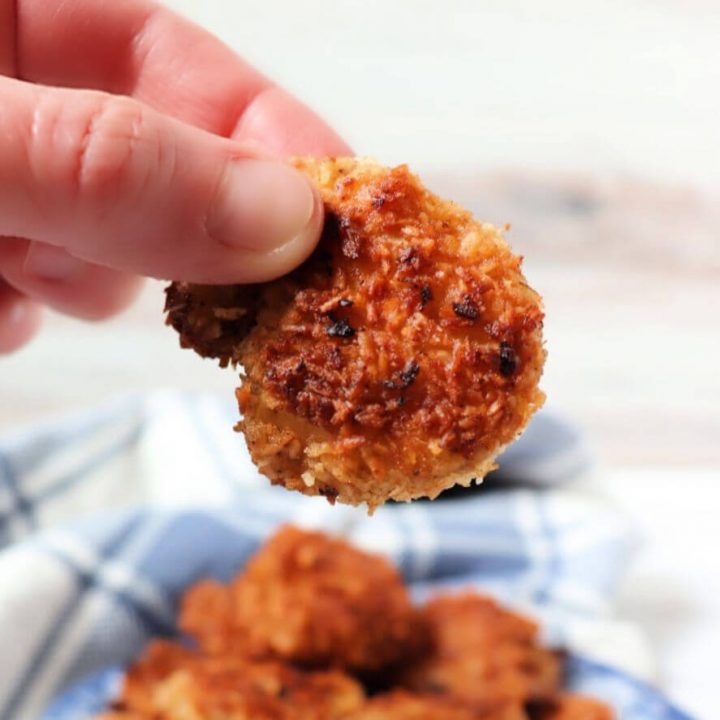
Keto Coconut Shrimp
Delicious keto coconut shrimp brings the familiar taste you love in sugar-free and gluten-free form. Perfect when dipped in sweet chili sauce.
Ingredients
- ⅓ cup coconut flour
- ½ teaspoon salt
- ½ teaspoon ground black pepper
- 2 large eggs
- 1 ¾ cup unsweetened shredded coconut
- 2 tablespoon powdered sweetener (such as Swerve Confectioners)
- 1 pound large raw shrimp, peeled and deveined
- ⅓ cup coconut or avocado oil (for frying)
- 1 recipe Keto Sweet Chili Sauce
Instructions
- Start with 3 medium bowls. Combine the coconut flour, salt, and pepper in one. In the second bowl, beat the eggs. Mix the coconut and sweetener together well in the third bowl.
- Dip the shrimp into the flour, then the eggs, and then dredge the shrimp into the coconut mixing, pressing gently to adhere. You want a lot of coconut on each shrimp. Set the coated shrimp aside on a plate as you coat the remaining shrimp.
- Add enough oil to cover the bottom of a large skillet on medium heat. Fry the coconut shrimp in batches, but do not crowd them in the pan. Fry about 6 to 7 at a time. Flip after 2 minutes and fry the other side for 2 minutes or until golden brown. If you like them darker fry for 3 minutes on each side.
- While you fry the rest, place the finished coconut shrimp on a plate lined with a paper towel. Serve with keto sweet chili sauce or your preferred keto dipping sauce.
- Sprinkle with some chopped chives (optional) and serve.
- Leftover coconut shrimp keeps in the refrigerator for up to 3 days.
Notes
Nutrition Facts
Servings 6.0 Calories 347 Total Fat 28 g Saturated Fat 22 g Monounsaturated Fat 0 g Polyunsaturated Fat 0 g Trans Fat 0 g Cholesterol 177 mg Sodium 643 mg Potassium 23 mg Total Carbohydrate 4 g Dietary Fiber 2 g Sugars 1 g Protein 19 g Net Carbohydrate 2 g
Nutrition Information:
Serving Size: 6Amount Per Serving: Calories: 347
*Nutrition Facts per MyFitnessPal.com. For most accurate facts, calculate your own with the exact ingredients you use in the recipe.
Nutrition Disclaimer
Please be aware I am not a medical specialist or nutritional professional. On this blog, I share recipes and what works for me. Please do not take anything on this blog as medical advice and always consult with your doctor before starting any diet or exercise program.
I use MyFitnessPal.com to calculate nutrition facts as a courtesy to my readers, and I remove erythritol from the final carb count and net carb count because does not affect my own blood glucose levels.
This is as accurate as possible, but it's best to independently calculate nutritional information on your own with the specific ingredients you use. I expressly disclaim any and all liability of any kind with respect to any act or omission wholly or in part in reliance on anything contained in this website.

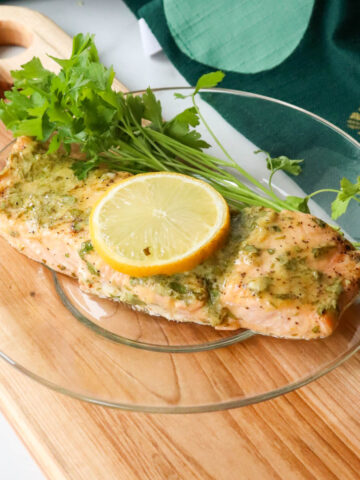
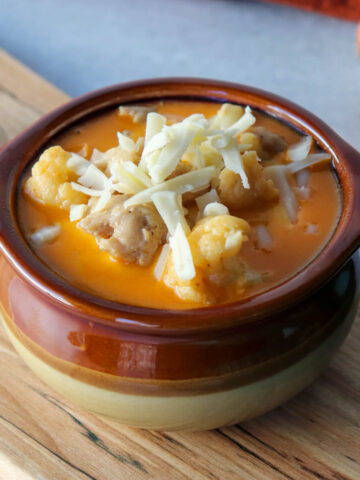
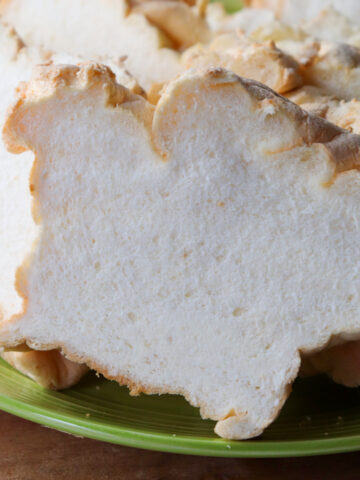
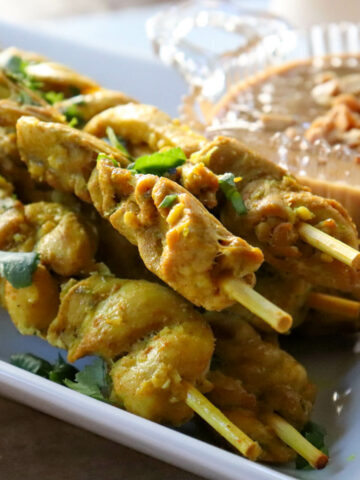
Leave a Reply